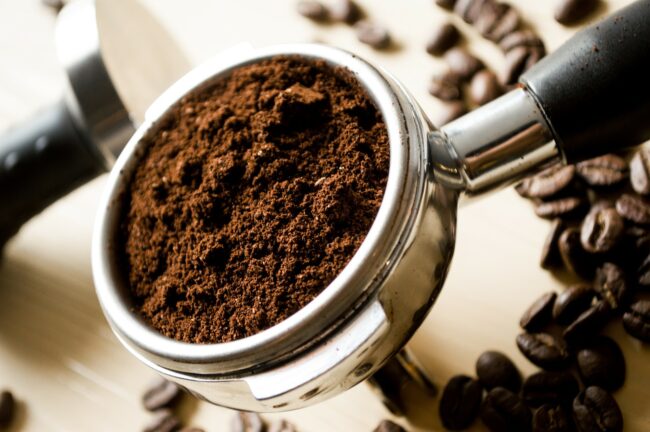Table of Contents
Many people feed their dogs caffeinated foods and beverages, assuming that it’s harmless. While the intention might be to spoil your dog, caffeine is one of the most problematic substances for pets and it should be avoided.
But what if you’re a responsible dog owner who doesn’t serve their dog coffee in the morning – however, your pooch accidentally fished out coffee grounds from the bin or found some on the floor? You’re pretty sure that your pet ate some or all of it. Now what?
Our article gives you all the information you need to help your pet and prevent a possible medical emergency.
Are Coffee Grounds Bad for Dogs?
In a word, “Yes.” Coffee grounds are dangerous and, in some cases, highly toxic for dogs.
The effects of coffee stem from caffeine. This chemical is a stimulant that interacts with the central nervous system and that’s why you feel energized after a cup of coffee.
But a dog’s metabolism is much different than humans. They are much more sensitive to the effects of coffee. An overdose of caffeine will overload their central nervous system, causing dogs to act anxious and impatient after consuming coffee.
Caffeine is not just limited to coffee. It’s also in other food products, like tea, candy bars, sodas, sports drinks, and more. But this stimulant is present in high concentrations in some coffee brands.
How Much Coffee is Bad for Dogs?
Knowing that coffee is bad for dogs, it’s worth asking what amount of coffee is harmful to your canine pet.
The amount will depend on the age of your dog. Elderly dogs are more vulnerable and sensitive to coffee. Even smaller dosages can make them anxious. The symptoms will be less severe for the same dosage for younger dogs, but they will be affected nevertheless.
A medium-sized dog might develop complications when exposed to one or two tablespoons of coffee. A smaller dog may even die if it takes the same amount.
As a general rule, any amount above 1 tablespoon is unsafe for dogs. For a more precise calculation, 14 mg of caffeine per pound of body weight should be considered dangerous.
Symptoms of Caffeine Poisoning in Dogs
How do you know your dog has an overdose of coffee? They’re notorious for sniffing and licking anything that they deem edible. So they may have consumed the coffee in your absence.
After a few hours of ingestion, you’ll notice a change in your dog’s behavior. Just how drastic these changes will be depends on the dosage. The main problem is that coffee grounds are usually packed with caffeine and this can have lethal consequences, even in small amounts.
After one or two hours, you may see any or all of the following symptoms:
- Hyperactivity
- Restlessness and anxious behavior
- Increased body temperature
- Increased blood pressure
- Increased heart rate
- Vomiting
- Shaking and panting
- Seizures
- Constant whining
How to Treat Caffeine Poisoning in Dogs?
If you suspect your dog is suffering from caffeine poisoning, you should be quick on your feet.
The first is to stay calm and not freak out. As a pet parent, it is hard to see your dog whine and shake. But it’s essential to control your emotions and take the necessary actions.
The best thing to do is to rush your pet to the vet. They are professionals and more capable of diagnosing the severity of the overdose. Before then, it’s also vital that you do not feed him anything else apart from water.
If it’s not possible to visit a vet, you should consult with one over the phone. The vet will ask you specific questions to determine the context. You should communicate the amount ingested (if you have that information) and the symptoms.
Before your vet goes ahead with the treatment, they need to make sure that caffeine poisoning is the real cause of the symptoms and not something else. An improper diagnosis can be more fatal than caffeine poisoning.
After diagnosing your dog, the vet will recommend a few options to try.
Gastrointestinal Decontamination
Gastrointestinal decontamination refers to the process of flushing out the stomach content, thus decontaminating it from any impurities.
This contamination is achieved with a gastric lavage that’s inserted through the mouth opening. The procedure is performed by an expert and is successful in most cases.
Induced Vomiting
After consuming coffee, your dog will vomit on its own. But you can induce the process as well. You can try to induce vomiting in your dog so that the coffee comes out along with the vomit. This is a tactic that should happen with your vet’s approval only.
The vet will prepare a solution of hydrogen peroxide, which you need to feed to your dog. This method is also very effective in treating caffeine poisoning in dogs.
Treatment with Activated Charcoal
If your dog vomits on its own, or you induce the process, you should feed him a few pieces of activated charcoal. This method prevents the absorption of any remaining coffee into the stomach. The charcoal will naturally come out in the dog’s feces.
Medication for the Central Nervous System
The central nervous system may show signs of distress, mainly through seizures. It confirms that the dog had a coffee overdose.
In such cases, the use of drugs becomes necessary. After a discussion with your vet, you can administer certain medications. It includes medicines like tranquilizers, phenobarbital, and diazepam, among others. The vet may also recommend anesthetic drugs like Isoflurane.
As you can see, there are many ways to treat caffeine poisoning in dogs. It just depends on the dosage and how much has passed since your dog ate the coffee grounds.
After the treatment, the dog should recover in a couple of days and return to its regular activities. The vet may recommend a follow-up visit to ensure that everything is fine.

